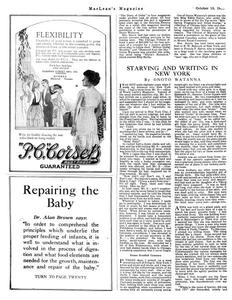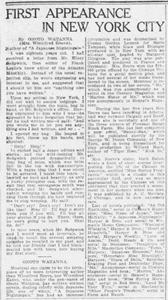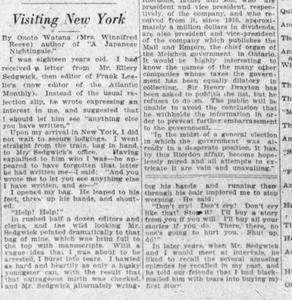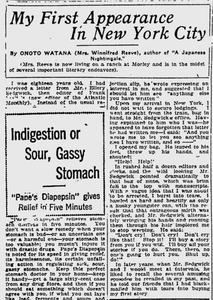I shared a dingy room on the third floor of a house on East Sixteenth street with two other girls. My roommates were as penniless and improvident as I, but we managed to exist and even squeeze a measure of fun out of life. Each staked the other when the other was broke. That worked very well, except when we were all broke at the same time, when we had much ado to make two ends meet.
The first of my room-mates was a dark-eyed girl from Tennessee. She was studying vocal culture—or rather she studied it when she had the price. She would hire a piano for $5 a month. At the end of the month the piano people would begin to dun and they would keep on dunning for another month, at the end of which time, they would take the piano, but at that rate she had the piano for two months at the price of one, and showed no compunction in the matter, as she fervidly believed that a God given gift was hers, to which the world owed a contribution.
Jocelyn, Jossy as we called her, was an outlaw from home because of her operatic aspirations, of which her family heartily disapproved.
Anna Andison, my other room-mate, was an overwhelmingly beautiful girl of Danish
birth. She had milk white skin, dead gold hair and eyes as blue as a Danish lake,
big, friendly, trusting eyes they were—simple and empty, the kind men—some
men—plunge into. Anna was built on a grand scale, and her feet and hands were
fashioned to match her great graceful body. I had discovered Anna. She was holding
down a perfectly respectable position as waitress at Bamberger’s when I assured
her that she was destined for greater things. I knew a man who knew a stage hand
who knew the stage director at Weber & Fields theatre. To this man, I piloted
my willing Anna. The thing worked like a charm. Anna secured her first job in the
chorus. From that day she had but one ambition in life. To remain in said chorus.
Unfortunately, her aspirations were not shared by the managers for whom she
worked, and for two causes Anna was fired from one musical show after another. The
first was her utter inability to move with the speed and agility of the chorus
girl race, and the second the heaviness of her hand which resented familiarity
from those in authority over her.
When I first brought my great Dane home, Jossy, who was somewhat of an aristocrat,
was speechless over my find, which filled considerable of the limited space of our
room.
“Where in the name of heaven, did you find it?” she demanded, utterly unmoved by the
guileless friendly smile of the fair Anna.
“This is my
friend
, Anna Andison.” said I defensively. “She looks like a
picture I once saw of the daughter of a Viking, and I’m going to make her
famous. I know a man who knows a man who—”
“I tarnk you,” said Anna with touching gratitude.
“Where are you going to put it?” demanded Jossy. “I want that space where
she’s standing for my piano that’s coming today.”
“I set on dar bed,” said Anna with her friendly smile and proceeded to do so,
causing that rickety affair to creak alarmingly.
Jossy’s attitude was similar to that she had taken the day I came in from the
street with a half frozen kitten I had found shivering in our doorway. Jocelyn
declared there was no room in our room for cats or dogs. Anna, however, was no
kitten: in point of fact she more nearly resembled a great blonde bear.
However, she justified the value of her addition to our family, the very first
night.
The landlady was extremely stingy with bed clothes, and the two near woolen
blankets on our bed never really kept us warm. Anna was a human furnace. She was
better than any hot water bottle or bag ever invented. Snuggled up against her
warm back or front I slept as snug as the proverbial bug in a rug. That first
night I slept between my two friends, a sort of dividing link, but the following
morning, dilating upon the exquisite warm sleep I had enjoyed the night before,
the shivering Jocelyn—as before stated she hailed from the Sunny South and had
never been able to accustom herself to the chill and humidity of the New York
climate, declared that I was a pig to keep a good thing all to myself. So that
night
Anna
slept between us, and I never heard Jossy after that complain about her
presence in our home.
So there we were, the three of us, making two ends meet on practically nothing.
Youth and bright wits are a combination hard to beat. It is true that some of the
means we resorted to when hard pressed to get a square, or half or even a quarter
of a square meal, though ingenious, they might not have been considered ethical by
our more affluent sisters, but then poverty is in a way a state of warfare and to
use Jossy’s favourite expression—she was convinced that we were all children of
destiny to whom the world owed a living- “The end justifies the means.”
For instance—on our parlor-floor abode a man of whose wealth and generosity and
susceptibility toward the fairer sex we had heard much from our garrulous
landlady. He had made sufficient inquiry concerning the fair Anna to cause said
landlady to climb the three flights of stairs to our room. I, alone in the room at
the time, thought when I heard her ascending that she was up for the rent. So I
hid under the bed. There I stayed for half an hour, while Mrs. Mueller proceeded
to examine our belongings and read our correspondence, and there no doubt I would
have remained a longer period had I not, upon Jossy’s advent into the room, intent
on hearing our affluent lodger’s opinion of Anna, as retailed by Mrs. Muller
incautiously come too far to the edge of the bed, and Jossy, whose ankle I touched
thought I was a mouse, and screamed alarmingly. Then, as I retreated to the wall,
Mrs. Mueller poked under the bed with a broom and I came forth, to soothe the
hysterical Jossy and smoothe down the suspicious and angry Mrs. Mueller. But from
that day I never could reinstate myself in my landlady’s regard. She suspected me
of the blackest crimes, and mourned over the association of a perfect lady like
Jocelyn with a suspicious character like I.
However, Mrs. Mueller’s call upon us was not for the purpose of demanding overdue
rent, but to convey a pressing invitation to our Anna from aforementioned affluent
boarder, to accompany him to a dinner and dance that night at Schultz’s on Third
avenue.
Now it may be mentioned here, in parenthesis, that for some days the three of us
had been subsisting on a few cents worth of crackers and boiled dog meat—you could
get dog meat for a couple of cents a pound and the bones were thrown in free—as we
were all out of a job. That is, Anna was out of a job. Jocelyn had no visible
means of livelihood save an occasional $5 or $10 sent to her surreptitiously by an
old colored mammy who had been her nurse, and whose heart was softer than the
family who banned the girl’s theatrical aspirations. I, on the other hand, was
eking out a sort of living by writing, and I may say here that few and far
between, in those days, were the stories accepted by the icy-hearted editors who
sat in judgement upon my scripts. It will therefore be seen that the three of us
were up against it, and we hailed this pressing invitation to a regular dinner
with joy and thanksgiving.
However, there now arose the question of a dress for Anna. She possessed but one
and that hardly of a kind calculated to charm a desirable suitor, nor suitable for
a dinner and dance at Schultz’s. Accordingly I proffered her my own sole party
frock. It was a pink and fluffy, and I was small and dark. I weighed at that time
about 100 pounds. Anna tipped the scales at a royal 185 pounds. However, Jossy was
a genius with the needle. She let down that dress at least a half a foot. I then
took Anna in hand, and, attaching her by her corset strings to the bed. I bade her
pull. She pulled as hard as only a great Dane could.
Finally, firmly encased in that fluffy pink frock, we lead her with true maternal
pride down to her waiting man.
She had given us her solemn word of honor—crossed her neck, crossed her heart,
hoped she might die if she didn’t, that she would order without stint at that
dinner and that she would stow away in her ample insides only one-third of that
dinner. The remaining two-thirds she would confide to the capacious bag with which
we had provided her.
That evening Jossy and I spent in discussing the things we liked best to eat. I
was partial to lobster, hot dogs, chop suey, pickles, French pastry, spaghetti,
welsh rarebit, pancakes and dumplings. Jocelyn said that the mere thought of a
rare porterhouse steak entirely surrounded by onions made her teeth water, and as
for green corn—at that very moment she was prepared to give up her operatic career
to bite upon a Tennessee ear. I talked her out, or rather back to her career,
though she gulped and sobbed a bit. Talking over these matters only aggravated our
condition, and as it was now 10:30 and no sign of Anna, Jocelyn suggested that we
should go after her. She said that it was not proper for a young and innocent girl
to be out alone at night with a man. They never did such things in Tennessee.
Accordingly we two sallied forth and arrived duly at Schultz’s which was above a
restaurant on Third avenue. We had some trouble at first in locating our Anna in
the crowded ball room as she was backed up against a wall surrounded by a solid
mass of admiring males. I could see at once that my dress had made a hit. Upon
approaching her nearer however, I recognized certain signs in Anna that loudly
bespoke distress of mind.
Whenever Anne was unduly moved by emotion or excitement she would forget the
exquisite French accent that I was painstakingly teaching her, and would lapse
into a sort of English version of her mother tongue. Now as we pushed our way
through the mob surrounding her, she leaned to my ear and whispered hoarsely:
“I ban busted!”
“You ban what?” I whispered back, also hoarsely.
“I ban busted. I ban busted on dam corsets and I ban busted on dam dress on dam
back.”
I know that backless evening gowns are now the vogue in high society but it was
not so in my young days, and I realized at once the impending disgrace that would
befall us should Anna turn around.
Jocelyn, the resourceful and practical in all crises, sprang into the breach and
hissed at Anna:
“Faint! Faint! Faint! Faint, you big slob. Fall over. Pretend to die!”1
When at last it percolated through Anna’s skull that a swoon might save the day
she fell back with such a crash that I am sure she nearly broke the arm of the man
from the parlor floor who nobly sprang to her rescue.
There she lay in a dead faint on the floor, her rosy face upturned, and her ruby
lips apart as she breathed through them stertorously.
So enchanted was I with the picture she presented, that I could not resist doing
my bit in the drama of the moment. Dropping upon my knee by her side, I entreated
her to speak to me, to speak to me once, once only, dear, dear Anna. So well did I
play my part that that big simpleton upon the floor, who loved me, patted my hand
reassuringly with her own big white one as the furious Jossy pulled me to my feet
and named me all kinds of a fool.
Fortunately, soon after this, the Dutch delicatessen man down our street fell
passionately in love with Anna, and for a time we lived upon the fat of the land.
I made up a rhyme which we sang to the tune of “Just before the Battle, Mother.”
Jocelyn would sit at the head of the stairs, when Anna’s beau was calling below,
and she would croon in her deep, heartreaching contralto:
Don’t forget the cheese and butter,
Don’t forget the bread and jam;
Don’t forget the pickles, Anna,
And the piece of ham.
Goodbye, Anna, we shall never
Eat a little bite till you get back,
But you’ll not forget us, Anna,
When you fill your little sack.




